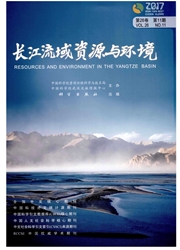

 中文摘要:
中文摘要:
北京作为中国首都已经出现了许多不相适应的弊端,困扰着首都功能的正常发挥,而且这些问题呈进一步恶化的趋势。无论改都论、双都论还是展都论,都不能从根本上解决北京日趋集中的问题。从北京存在的一系列问题入手,指出了迁都的必要性;然后从迁都的历史可行性、经验可行性、经济可行性和操作可行性4个方面论证了迁都的可行性;运用定量与定性相结合的方法,构建理想首都区化模型,对迁都方佗进行了选择。认为长江中游地区是建立新都的最理想方位,并从首都安全、定都成本和区位影响角度,分析了长江中游地区建设中国新都的不可替代的优势,最后还探讨了模型的计算尺度问题和迁都应注意的问题。
 英文摘要:
英文摘要:
A series of conflicts have emerged due to the status of Beijing as a capital city in China,resulting in the failure of Beijing to fulfill its function which should be expected for a capital city,and these problems have been increasingly deteriorated. The idea to alter the city,to have dual cities or to expend,has not provided a real solution to solve the problem with the trend of centralization in Beijing in many aspects. This article proceeded with the problems in Beijing and pointed out the necessity of relocating the capital city in China. Then, it analyzed the feasibility for relocating the capital city, in terms of historical lessons, previous experiences, economic viability and workability. Finally,through the combination of quantitative and qualitative methods, the authors established an ideal location model for choosing capital location. It is concluded that the middle reaches of the Yangtze River are the best choice as place for capital city. The incomparable advantages of this region were analyzed as a capital from such aspects as security, cost and location,and problems with measuring the scale for the model and those deserving attention during the process of relocating the capital were also examined.
 同期刊论文项目
同期刊论文项目
 同项目期刊论文
同项目期刊论文
 期刊信息
期刊信息
